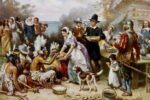“My wife grew up Christian. For her family, Thanksgiving always starts with a prayer. I’ll be joining my in-laws for Thanksgiving this year, and they’ve asked if I’d like to share a Jewish prayer. I want to pick the right one; what should I say?”
Great question and obviously a timely one for us all, since the majority of us have family members of other faiths and will likely break bread with them this Thanksgiving.
Thanksgiving is perhaps the perfect intersection of our two great religious traditions in Judaism and Christianity. Unlike Christmas vs. Chanukah or Easter vs. Passover, where there are clear theological conflicts and a myriad of real-life complications, Thanksgiving is conflict-free (unless you talk politics, in which case you’ll probably need more than prayers to navigate that terrain with grace and peace).
Thanksgiving, on the other hand, contains the best of what it means to be an American—gratitude for abundance, inclusivity in our society and around our table, open hands, open arms, open hearts. Thanksgiving is, in many ways, the summation of the heart of both Judaism and Christianity—faith, gratitude, peace and brotherly love.
Too easily, however, it turns into just another meal, another family gathering, another seemingly ordinary day. The religious mission, however, is to elevate the mundane into the sublime, to remind us that the ordinary can and should become the extraordinary. That is one of the reasons we might choose to bring religious readings to the table and something I applaud you for doing.
There are so many prayers in both of our traditions that bring to light these themes of gratitude and abundance, welcome and compassion. With that said, I think it’s important to choose some that bring you a sense of integrity. One should never speak words in prayer or in life that don’t reflect your beliefs, your integrity, your soul. One should also take into consideration both the nature of the day and the others around the table. In this case, with your in-laws being Christian, there are plenty of prayers to be drawn from our shared tradition of the Hebrew Bible, specifically the latter part of the Hebrew Bible, known as “the Writings” and “the Prophets.” I encourage you to peruse these sections of the Bible—but most likely you will end up within the Psalms.
The Psalms, attributed to King David, express a soul’s longing for God, gratitude for living, uncertainty about the future and the quest for faith, compassion and goodness. Here are some Psalms you might want to consider, though I’d encourage you to read through them all and choose what speaks to your soul the most. Also, there are many different versions of these, so Google until you find a translation that speaks to you.
- Psalm 118 – Thanksgiving Day Prayer: God Is Good
- Psalm 100 – Thanksgiving Psalm: Praise
- Psalm 111 – Thanksgiving Psalm: Nourishment
- Psalm 30 – Thanksgiving: Give Thanks Forever
- Psalm 28 – Psalm for Thanksgiving: Let God Be Your Strength
- Psalm 150 – Thanksgiving Day Psalm: Every Soul Rejoice
Beyond the Psalms:
- “Thanksgiving Prayer” by Rabbi Maralee Gordon
- “A Thanksgiving Prayer” by Rabbi Naomi Levy
- “We Pray For Children” by Ina Hughs
In addition, here are a few more “edgier” but interesting selections (tread lightly with these at your in-laws’ table):
Hope this helps. Enjoy your turkey. Watch your football. Stuff yourself with pie. Talk politics if you must. But above all else, remember that love and peace, and gratitude and celebration, are what this is all about. Thank you for reminding us that this holiday is an expression of the great Judeao-Christian ethic upon which this great country has been built. Eat, drink and be merry, and read some Psalms as well.









